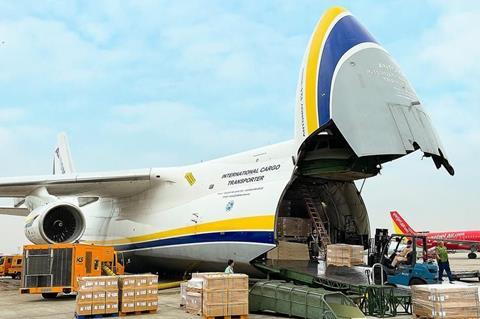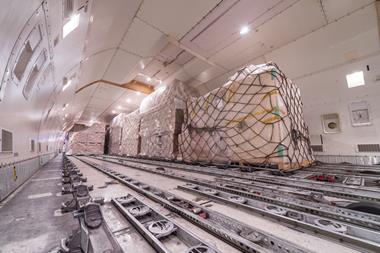
Sanctions imposed on Russian aircraft fleets are further squeezing air cargo capacity in an already constrained market.
Pierre Van Der Stichele, vice president of global freight at aviation services group Air Partner told Air Cargo News that airspace bans on Russian aircraft imposed by the EU, US and others have added to the existing pressure on airfreight capacity caused by the Covid-19 pandemic and ongoing seafreight congestion.
“Sanctions affecting Russian carriers have significantly impacted the air cargo industry,” said Stichele. “Freighter capacity has already been heavily reduced by the pandemic; the disappearance of additional capacity due to sanctions only exacerbates the difficulties facing the air cargo industry."
Volga-Dnepr Group’s Volga-Dnepr Airlines normally operates a fleet of 12 Antonov-124-100 aircraft and five Ilyushin-76-TD-90-VD aircraft, but these aircraft are now restricted to domestic operations.
The Volga-Dnepr Group (VDG) recently confirmed that it has taken the decision to temporarily suspend operations at its AirBridgeCargo and Atran Airlines subsidiaries in response to sanctions affecting lessors and the decision of Bermuda Civil Aviation Authority (BCCA) to suspend all airworthiness certificates for Russian aircraft on its registry.
AirBridgeCargo's fleet consists of 17 Boeing 747 freighters and 1 Boeing 777 F. Atran Airlines’ fleet comprises five B737Fs.
VDG partner company, UK-registered Cargologicair operates two 747-400Fs, while Leipzig-based VDG partner company Cargologic Germany operates four 737Fs. No activity has been seen for either airline on Flightradar24 for the last seven days.
Stichele pointed out that Ukranian Antonov Airlines, whose unique AN-225 aircraft was recently destroyed, is currently using its remaining fleet for humanitarian relief flights.
“Additionally, the Ukrainian Antonov Airlines, whilst still operating its remaining AN124s, is focusing its serviceable fleet solely on relief efforts in support of Ukranian refugees. This leaves only one outsized cargo operator available for all commercial project cargo demands, the AN124 operated by Maximus Air Cargo.”
He added: “The situation has also driven up fuel prices to record levels, however, the high level of demand is showing no sign of stopping.”
Antonov Airlines specialises in the transportation of outsized and project cargo worldwide using its fleet of seven AN-124-100 “Ruslan” aircraft, two of which have a payload up to 150 tonnes, its 60-tonne payload AN-22, and its unique 250-tonne payload AN-225 “Mriya”, which is the largest aircraft in the world, as well as smaller AN-74 and AN-26 aircraft.
Stichele added that P&O stopping its ferry operations while it carried out mass redundancy procedures put extra pressure on the airfreight sector, already under pressure from the pandemic and seafreight congestion.
"The ongoing situation with P&O Ferries presents the risk of severe port delays, particularly at Dover and Calais. The halting of these ferries and the group’s operations creates a surge of demand for other forms of travel such as rival ferry companies or the Euro Tunnel.
"This increase in demand will have a severe effect on already stretched cargo and freight capacity. Over 15% of all the freight and cargo capacity carried in and out of the UK is provided by P&O Ferries. Demand and costs for these services are at an all-time high and reorganising alternative means of delivery will be slow and costly.
"We have seen an increased interest in airfreight in the wake of previous situations that delayed sea freight services, such as the Suez Canal blockage last year. Additionally, there has already been a marked shift from sea to air due to ongoing seafreight problems as a result of pandemic-related disruption. We expect to see this trend continue as airfreight continues to become an ever more attractive option for exporters.”













